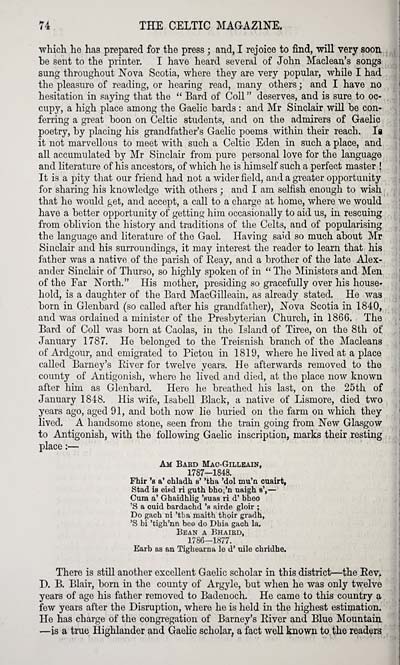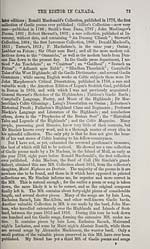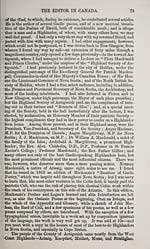Blair Collection > Celtic magazine > Volume 5
(84)
Download files
Complete book:
Individual page:
Thumbnail gallery: Grid view | List view

74 THE CELTIC MAGAZINE.
which ho has prepared for the press ; and, I rejoice to find, will very soon
be sent to the printer. I have heard several of John Maclean's songs
sung throughout Nova Scotia, where they are very popular, whUe I had
the pleasure of reading, or hearing read, many others ; and I have no
hesitation in saying that the " Bard of Coll " deserves, and is sure to oc-
cupy, a high place among the Gaelic bards : and Mr Sinclair will be con-
ferring a great boon on Celtic students, and on the admirers of Gaelic
poetry, by placing his grandfather's Gaelic poems within their reach. Ig
it not marvellous to meet with such a Celtic Eden in such a place, and
all accumulated by Mr Sinclair from pure personal love for the language
and literature of his ancestors, of which he is liimself such a perfect master !
It is a pity that our friend had not a wider field, and a greater opportunity
for sharing his knowledge with others ; and I am selfish enough to wish
that ho would get, and accept, a call to a charge at home, where we would
have a better opportunity of getting him occasionally to aid us, in rescuing
from oblivion the history and traditions of the Celts, and of popularising
the language and literature of the Gael. Having said so much about Mr
Sinclair and his surroundings, it may interest the reader to learn that his
father was a native of the parish of Reay, and a brother of the late Alex-
ander Sinclair of Thurso, so highly spoken of in " The Ministers and Men
of the Far North." His mother, presiding so gracefully over his house-
hold, is a daughter of the Bard MacGilleain, as already stated. He was
born in Glenbard (so called after his grandfather), Nova Scotia in 1840,
and was ordained a minister of the Presbyterian Church, in 1866. The
Bard of Coll was born at Caolas, in the Island of Tiree, on the 8th of
January 1787. He belonged to the Treisnish branch of the Macleans
of Ardgour, and emigrated to Pictou in 1819, where he lived at a place
called Barney's Eiver for twelve years. He afterwards removed to the
county of Antigonish, where he lived and died, at the place now known
after him as Glenbard. Here he breathed his last, on the 25th of
January 1848. His wife, IsabeU Black, a native of Lismore, died two
years ago, aged 91, and both now lie buried on the farm on which they
lived. A handsome stone, seen from the train going from New Glasgow
to Antigonish, with the following Gaelic inscription, marks their resting
place : —
Am Babd Mao-Gilleain,
1787-1848.
Fhir 'b a' ohladh s' 'tha 'dol mu'n cuairt,
Stad is eisd ri guth bho,'n uaigh s', —
Cum a' Ghaidhlig 'suas ri d' bheo
'S a ouid bardachd 'a airde gloir ;
Do gach ni 'tba maith thoir gradh,
'S hi 'tigh'nn beo do Dbia gach la.
Bean a Bhaied,
1786-1877.
Earb as an Tighearna le d' uile chridhe.
There is still another excellent Gaelic scholar in this district — the Eev.
D. B. Blair, born in the county of Argyle, but when he was only twelve
years of age his father removed to Baden och. He came to this country a
few years after the Disruption, where he is held in the highest estimation.
He has charge of the congregation of Barney's River and Blue Mountain
— is a true Highlander and Gaelic scholar, a fact well known to the readers
which ho has prepared for the press ; and, I rejoice to find, will very soon
be sent to the printer. I have heard several of John Maclean's songs
sung throughout Nova Scotia, where they are very popular, whUe I had
the pleasure of reading, or hearing read, many others ; and I have no
hesitation in saying that the " Bard of Coll " deserves, and is sure to oc-
cupy, a high place among the Gaelic bards : and Mr Sinclair will be con-
ferring a great boon on Celtic students, and on the admirers of Gaelic
poetry, by placing his grandfather's Gaelic poems within their reach. Ig
it not marvellous to meet with such a Celtic Eden in such a place, and
all accumulated by Mr Sinclair from pure personal love for the language
and literature of his ancestors, of which he is liimself such a perfect master !
It is a pity that our friend had not a wider field, and a greater opportunity
for sharing his knowledge with others ; and I am selfish enough to wish
that ho would get, and accept, a call to a charge at home, where we would
have a better opportunity of getting him occasionally to aid us, in rescuing
from oblivion the history and traditions of the Celts, and of popularising
the language and literature of the Gael. Having said so much about Mr
Sinclair and his surroundings, it may interest the reader to learn that his
father was a native of the parish of Reay, and a brother of the late Alex-
ander Sinclair of Thurso, so highly spoken of in " The Ministers and Men
of the Far North." His mother, presiding so gracefully over his house-
hold, is a daughter of the Bard MacGilleain, as already stated. He was
born in Glenbard (so called after his grandfather), Nova Scotia in 1840,
and was ordained a minister of the Presbyterian Church, in 1866. The
Bard of Coll was born at Caolas, in the Island of Tiree, on the 8th of
January 1787. He belonged to the Treisnish branch of the Macleans
of Ardgour, and emigrated to Pictou in 1819, where he lived at a place
called Barney's Eiver for twelve years. He afterwards removed to the
county of Antigonish, where he lived and died, at the place now known
after him as Glenbard. Here he breathed his last, on the 25th of
January 1848. His wife, IsabeU Black, a native of Lismore, died two
years ago, aged 91, and both now lie buried on the farm on which they
lived. A handsome stone, seen from the train going from New Glasgow
to Antigonish, with the following Gaelic inscription, marks their resting
place : —
Am Babd Mao-Gilleain,
1787-1848.
Fhir 'b a' ohladh s' 'tha 'dol mu'n cuairt,
Stad is eisd ri guth bho,'n uaigh s', —
Cum a' Ghaidhlig 'suas ri d' bheo
'S a ouid bardachd 'a airde gloir ;
Do gach ni 'tba maith thoir gradh,
'S hi 'tigh'nn beo do Dbia gach la.
Bean a Bhaied,
1786-1877.
Earb as an Tighearna le d' uile chridhe.
There is still another excellent Gaelic scholar in this district — the Eev.
D. B. Blair, born in the county of Argyle, but when he was only twelve
years of age his father removed to Baden och. He came to this country a
few years after the Disruption, where he is held in the highest estimation.
He has charge of the congregation of Barney's River and Blue Mountain
— is a true Highlander and Gaelic scholar, a fact well known to the readers
Set display mode to: Large image | Transcription
Images and transcriptions on this page, including medium image downloads, may be used under the Creative Commons Attribution 4.0 International Licence unless otherwise stated. ![]()
| Early Gaelic Book Collections > Blair Collection > Celtic magazine > Volume 5 > (84) |
|---|
| Permanent URL | https://digital.nls.uk/76449976 |
|---|
| Description | Volume V, 1880. |
|---|---|
| Shelfmark | Blair.6 |
| Attribution and copyright: |
|
| Description | A selection of books from a collection of more than 500 titles, mostly on religious and literary topics. Also includes some material dealing with other Celtic languages and societies. Collection created towards the end of the 19th century by Lady Evelyn Stewart Murray. |
|---|
| Description | Selected items from five 'Special and Named Printed Collections'. Includes books in Gaelic and other Celtic languages, works about the Gaels, their languages, literature, culture and history. |
|---|

